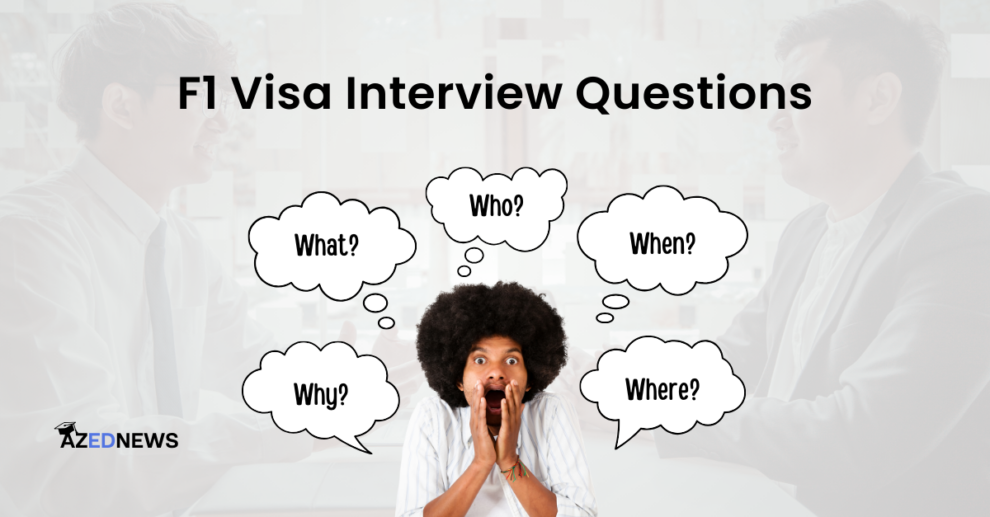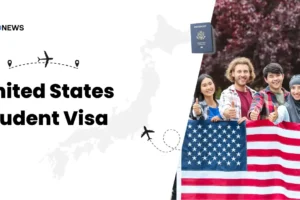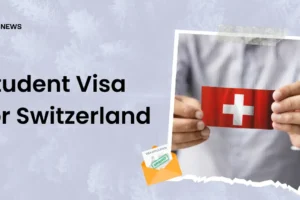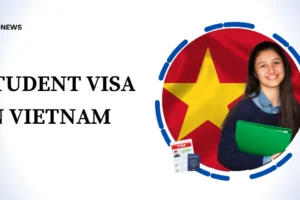Looking for F1 Visa Interview Questions? then you are at right place. If you are preparing for your US visa interview as an international student, you should know about the F1 student visa it is very important.
Table of Contents
If your dream is to study in the United States, then getting ready for your F-1 visa interview is important. You must practice answering commonly asked questions at the American embassy. It will help you feel more confident.
It gives you the best chance of getting accepted into a US college or university. In this article, we will go over the types of questions you might face during your F-1 student visa interview. Let’s get started.
How To Dress for Your F-1 Visa Interview?
When getting ready for your US visa interview, what you wear matters. If you pick the right outfit it shows that you take the interview seriously and are professional. Although there are not strict rules, it is best to stick to standard expectations. Here are some tips:
- Dress formally — Wear professional clothes like dress shirts, suits, or pantsuits to match the formal atmosphere of the interview.
- Keep accessories simple — Too much jewelry can be distracting, so go for minimal accessories. If you have religious items, wear only what is necessary.
- Go easy on fragrances — Some people are sensitive to strong scents, so you should opt for a light perfume or skip it altogether.
- Stay well-groomed — Clean nails, subtle makeup, and tidy hair can make a good impression. Keep your look simple and professional.
By dressing comfortably and smartly, you will feel more confident during the interview and leave a positive impression. Don’t forget to prepare all your documents beforehand too.
What Documents Do You Need for the F1 Visa Interview?
When you go for your F-1 visa interview, you must bring along some important documents. Here is what you will need:
- Your I-20 or SEVIS form from the US university you are planning to attend
- A completed DS-160 visa application form
- Receipts showing you have paid your visa application fee and SEVIS receipt fee
- Your visa appointment letter
- Your passport and a recent passport photo taken in the last six months
- Academic documents like transcripts, certificates, and diplomas
- Any standardized test scores you have
- Documents that prove your financial and personal ties to your home country. It should show that you will return after finishing your studies in the US
- If you have a sponsor, bring proof of your relationship and details about their employment and income
- Bank statements or other proof of your finances
These documents will be reviewed by the consular officer during your interview. Getting them ready early can make the process smoother and less stressful. Also, having them prepared gives you more time to practice for the interview questions.
Common Types of F1 Visa Interview Questions
F-1 student visa interview questions are designed to show why you will be traveling to the US. It establishes your status as a legitimate student.
You should be prepared to answer specific, personal questions for the student visa interview about your reasons for attending college or university in the US. Before your interview, you can study examples of American embassy interview questions for a student visa in advance so you can prepare effectively.
There are five categories most US F-1 visa interview questions will be based on:
- Study plans
- University choice
- Academic history
- Financial status
- Post-graduation plans
Let us take a look at F-1 student visa interview questions and answers for each category.
1. Study Plans in the USA
During your F-1 visa interview, the interviewer will ask you about your study plans in the United States. They will want to know why you chose to study in the US and what you plan to study. These questions are similar to the ones you might have answered in your university application essays.
Here is a list of possible questions you might be asked during your F-1 visa interview about your study plans in the US.
1. Why do you want to study in the US?
- Tell them what convinced you to study in the U.S.
- You can mention that the US is a top destination for higher education with excellent universities. It supports international students, and has diverse programs.
- Also, talk about how studying in the US can help you improve your English skills and connect with students from around the world.
2. Why can’t you continue your education in your home country?
- Discuss the quality of education in the US compared to your country.
- Mention the top-ranked universities and how getting a degree from the US is a goal for you.
- You can also explain if the field of study you want is not available in your home country.
3. What do you plan to study?
- Talk about your major area of interest. For example, if it is computer science, mention how you want to use technology to make a difference in fields like healthcare or education.
- If it is business, discuss the career opportunities and versatility of a business degree.
4. Have you been to the US before?
- Explain the purpose of your previous trips if you have any.
- If not, simply say you have not had the chance to travel or study there yet.
2. University Choice
When the visa officer asks about the university you want to attend in the US, they want to know why you chose it and how it fits with your academic goals. Please remember, getting accepted into a top-ranked university can boost your chances of getting an F-1 student visa.
Here are some questions you might get during your F-1 visa interview about your university choice and tips on how to answer them. These questions help them understand your reasons and how well you have researched your university options.
1. Why did you choose this university?
- Tell them why you think this university is the best fit for your major.
- Mention things like the university’s ranking, faculty, programs, student organizations, and alumni network.
- If notable people graduated from there, mention them too.
2. How many universities did you apply to?
- Just be honest. If you applied to several, say so. If you only applied to one, say that too. Honesty is the key.
3. Where is your school located?
- Keep it simple. Just mention the city or town where your school is.
- If you want, you can add a little detail about the location. For example, if your school is in Chicago, you could mention all the cultural attractions there or the big companies in the area. It shows you did your homework!
3. Academic History
The interviewer might ask about your test scores, English skills, or high school grades to see if you will do well in your studies in the US. Even though you are already accepted, they want to make sure you can succeed. If you share these details, it helps them decide if you are ready for college life in the US. So, be prepared to talk about your academic background during the interview.
Here are some F-1 student visa interview questions and answers about your academic background:
1. What were your test scores?
- You should tell the interviewer about the scores you got in exams like TOEFL, IELTS, GRE, GMAT, ACT, or SAT. If you share these scores, it helps them understand your academic abilities.
2. How well do you speak English?
- Your TOEFL or IELTS scores show how good you are at English. Even though you have been accepted by a university, mentioning these scores shows your commitment to improving your English skills.
3. Can you show your high school grades?
- You should have all your important documents ready for the interview, like your high school transcripts, passport, DS-160 confirmation page, and visa payment receipt. When the interviewer asks, you can easily hand over the documents they need.
4. Financial Status
To get your US student visa, you need to prove that you have enough money to cover your expenses while studying there. Your visa officer will want to see your financial plan. It should include things like tuition, housing, food, health insurance, and transportation costs. If someone is helping you with money, like a sponsor, the officer might ask how you know them and how they will support you.
Here are some questions the visa officer might ask you about how you plan to pay for your education:
1. How will you pay for your studies?
- Explain how you will cover your tuition and fees while you are studying in the US.
- Avoid discussing how much you might earn there.
- Instead, focus on how getting a degree from a US university can lead to better job opportunities back home.
2. Who is helping you financially?
- If you got a scholarship, mention it and provide details.
- If it’s your parents or someone else, say their name and your relationship, like “My uncle, Andrew Charles is paying for my education.”
3. What does your sponsor do for a living?
- The officer wants to know if your sponsor can afford to support you.
- Before the interview, make sure you know what your sponsor does and how they earn money.
- Explain their job and how they are committed to paying for your education.
4. Do you plan to work while studying in the US?
- As an F-1 student, you can work part-time on campus while classes are in session, and full-time during breaks.
- Tell the officer that you want to focus on your studies but are open to on-campus jobs if they are available.
5. Post-Graduation Plans
When you are thinking about working in the US after you graduate, it is important to show that you plan to return to your home country once you have completed your degree. During your visa interview, be sure to explain to the officer why you intend to go back home after finishing your studies.
In your immigration interview, you might be asked about your plans after graduation. Here are some questions you could face:
1. After you finish your studies, do you plan to go back to your home country?
- Let the officer know that you have strong connections back home, like family, friends, or business interests, that you want to return to. This helps them see that you are committed to going back home.
2. Do you have any family or friends living in the US?
- Be honest about whether you have relatives or friends in the US. If you do, mention them.
3. What are your career plans after you graduate?
- Explain that although you are interested in studying in the US, your goal is to return to your home country to work after graduation.
- Talk about what you plan to do back home.
How to Prepare for Your F-1 Visa Interview?
You are not alone in facing the F-1 visa interview. Over a million international students go through the same process. Stay relaxed, practice your answers to visa questions. Make sure you have all your documents ready for the interview day.
To learn more about the F-1 visa, check out Uscis.gov. For additional details on traveling to the US with an F-1 visa, you can visit Travel.state.gov.
Frequently Asked Questions
1. How can I pass my F1 visa interview?
Here are the top 8 tips to pass your visa interview:
– Make a good impression right from the start. Be polite and friendly.
– Prepare well for the interview by knowing what to expect and practicing your answers.
– Stay calm and believe in yourself during the interview.
– Keep your responses short and clear. Avoid unnecessary details.
– Make sure you have all the required documents ready to show.
– Present the financial documents required to support your stay in the US.
– Explain how your chosen program aligns with your future career goals.
– Avoid giving answers that might make you seem like you want to immigrate permanently.
2. What should you avoid during an F1 visa interview?
When you give different answers in your F1 visa interview, it can make the interviewer doubt your honesty. Make sure your responses match what you have stated in your application and documents to avoid this mistake.
3. What are the most common F1 visa interview questions?
Here are some common questions you might get asked in your F1 visa interview:
1. Why do you want to go to the United States?
2. Where are you currently studying?
3. What is your reason for wanting to continue your education?
4. How many colleges did you apply to?
5. Do you know any professors at the university you are planning to attend?
6. Have you ever been to the United States before?
4. Is an F1 visa interview tough?
Facing a grilling interview with the Visa Officer can be a nightmare for anyone. It is natural to worry about your plans getting derailed if your application is rejected. But there is no need to fear. The interviewer does not have a goal of rejecting applications. So, while the process may seem intense, stay confident and remember that the interviewer is there to understand your situation, not to refuse you.
5. How can I impress my visa officer?
When you go for your visa interview, make sure to answer the questions. To do this, you need to know about your study programs and future career plans well. Also, please remember not to make your answers sound too exaggerated. Consular officers usually prefer straightforward and brief answers.
Conclusion
During your F1 visa interview, it is important to stay calm. Being prepared for your F1 visa interview questions is important. You should have all the documents and receipts you need so you can concentrate on answering the interview questions. Remember to answer all the questions honestly and openly. This is the only way to pass your F1 student visa interview smoothly.












Add Comment